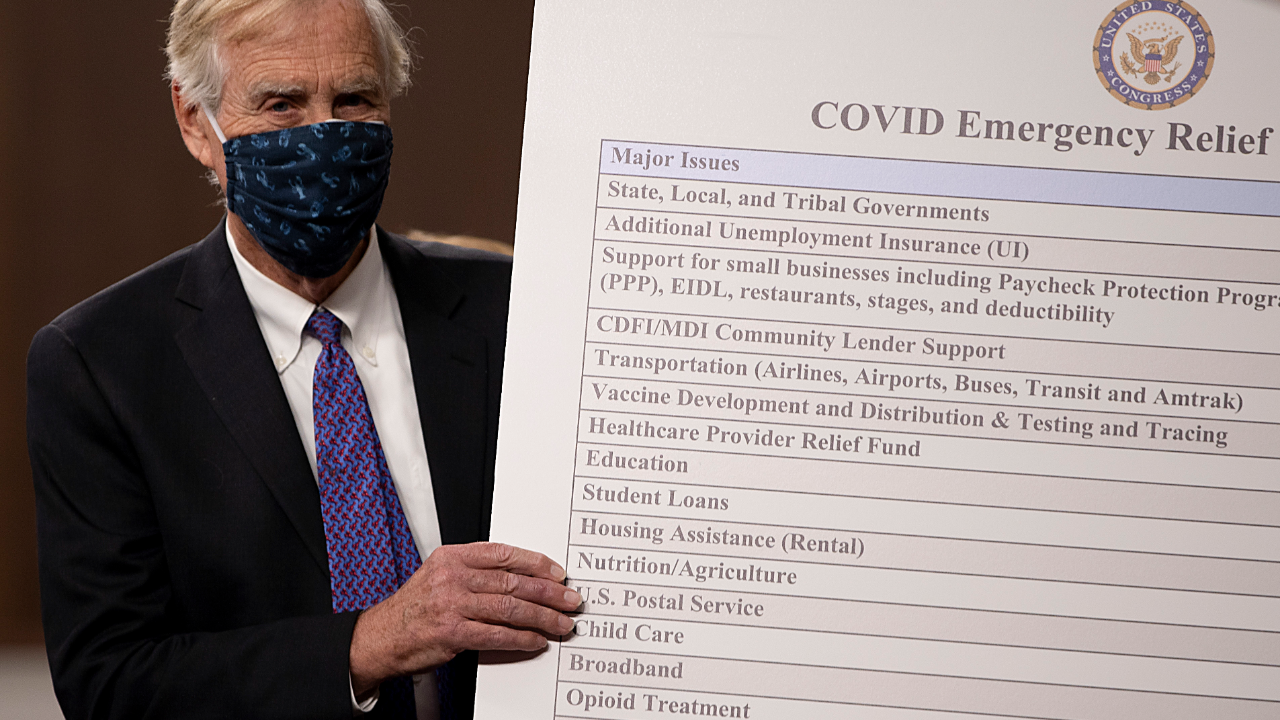$300 unemployment check boost: Here’s what’s in the latest coronavirus stimulus proposal

Legislators on Tuesday made their most concerted effort since the 2020 presidential election to strike a deal on the next round of pandemic relief amid soaring coronavirus caseloads, and just a month before nearly 12 million Americans are set to see their weekly jobless benefits expire.
A bipartisan group of senators on Tuesday outlined a $908 billion relief plan that would provide an additional $300 in weekly benefits for four more months, send financial relief to clobbered state and local governments and replenish a small business relief fund. The bill, however, glosses over sending middle-income Americans another $1,200 stimulus check.
If passed, the proposal would be the first major relief plan since the wide-sweeping CARES Act in March. Democrats and Republicans, however, still appear far apart in priorities, with House Speaker Nancy Pelosi pushing for a bigger package than Senate Majority Leader Mitch McConnell appears willing to support. Yet, Pelosi and Treasury Secretary Steven Mnuchin are also resuming their negotiations, and the bipartisan compromise in the Senate might reflect a growing urgency to funnel out cash to Americans.
Here’s what you need to know about the provisions in the bill and how soon it could filter through to your wallet.
Unemployment relief: How much would Americans receive and for how long?
How much and for how long to extend weekly jobless benefits has been the center of the debate for lawmakers. The CARES Act boosted weekly benefits by $600 for an additional 13 weeks and helped typically ineligible gig workers, freelancers and independent contractors qualify. All in all, the programs were designed to help get Americans as many as 39 weeks of payments, when they paired the federal programs with what their state was already providing (on average, 26 weeks of checks). That $600 amount, however, expired in July.
The Senate’s bipartisan bill would reduce that enhancement to $300 for 18 weeks, or until March 2021, including for the gig workers whose weekly checks would sink to zero in January. The checks would be retroactive to Tuesday, Dec. 1, according to Sen. Joe Manchin (D-W.Va.), who is one of the bill’s sponsors.
That would prevent as many as 12 million Americans from losing their jobless benefits at a time when unemployment is the highest since late 2013, according to the left-leaning research firm The Century Foundation.
Help for small businesses: More PPP funding
The Paycheck Protection Program (PPP) became the centerpiece of the federal government’s quest to save small businesses, but the program ended in June with over $130 billion in funds remaining. Administered through the Small Business Administration (SBA), firms with fewer than 500 employees were able to secure a forgivable loan if they were able to prove that they kept paying their workers for eight weeks.
The bipartisan proposal would replenish that pot by roughly $288 billion, potentially backstopping funds as cases surge again and states renew some business restrictions that might weigh on small firms’ profitability.
Other key stimulus provisions
While details on other provisions are scarce and subject to change, senators also unveiled plans to send:
- $160 billion in aid to state and local governments
- $82 billion for education funding
- $45 billion for transportation agencies
- $26 billion in nutrition assistance
- $25 billion for rental assistance, which might be a temporary antidote to a September Trump administration provision that’s expiring in December, allowing the Centers for Disease Control and Prevention (CDC) to halt evictions for most renters through the rest of 2020
- $16 billion for health care to help with coronavirus testing and contract tracing, as well as vaccine distribution
- $4 billion for student loans
- Liability protections from coronavirus-related lawsuits for business and other organizations
Bottom line
Senators across the spectrum of Democrats, Republicans and Independents back the bill, from Manchin and Mark Warner (D-Va.), as well as Bill Cassidy (R-La.), Mitt Romney (R-Utah) and Susan Collins (R-Maine). Backing the bill is also the Problem Solvers Caucus, a group of lawmakers behind a similar piece of framework legislation introduced in mid-September.
“COVID has created a crisis,” Romney said Tuesday in a news conference announcing the proposal. “And in the crisis, the people expect Congress to act.”
Manchin added during that gathering that he didn’t know whether Pelosi or McConnell would buy into their proposal but described the bill as a template, given that it fulfills key items on the wish list for both sides of the aisle.
Rep. Rashida Tlaib (D-Mich.) voiced her complaints that the bill left out another round of $1,200 stimulus payments, which lawmakers specifically excluded to bring down the overall cost of the bill amid deficit concerns.
President-elect Joe Biden may want to encourage Pelosi and Senate Minority Leader Chuck Schumer to push for a larger relief package, though lawmakers may also be inclined to get relief passed as soon as possible. Mnuchin, who will be working with Pelosi on most of the fiscal bargaining, stressed Tuesday the urgency for lawmakers to come to a compromise and quickly.
“More fiscal response is needed,” Mnuchin said during testimony with Federal Reserve Chair Jerome Powell on Capitol Hill. “What’s more important is what we can pass quickly on a bipartisan basis to target the most difficult parts of the economy.”
Learn more:
- 13 steps to take if you’ve lost your job due to the coronavirus crisis
- What to do if you can’t pay your loans during the coronavirus
- When should you spend your emergency fund?
Why we ask for feedback Your feedback helps us improve our content and services. It takes less than a minute to complete.
Your responses are anonymous and will only be used for improving our website.






